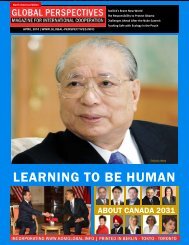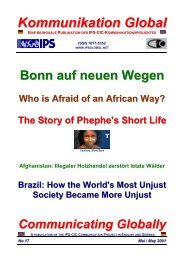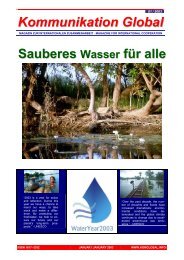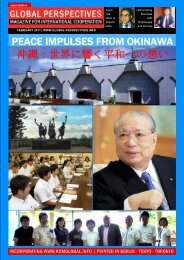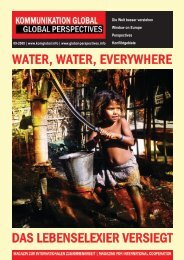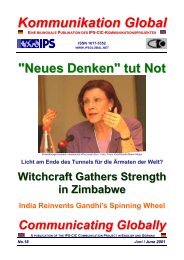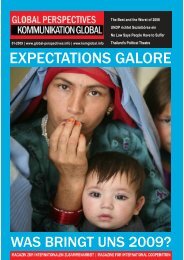GLOBAL PERSPECTIVES | Second Quarterly 2013 â North America ...
GLOBAL PERSPECTIVES | Second Quarterly 2013 â North America ...
GLOBAL PERSPECTIVES | Second Quarterly 2013 â North America ...
You also want an ePaper? Increase the reach of your titles
YUMPU automatically turns print PDFs into web optimized ePapers that Google loves.
<strong>GLOBAL</strong> <strong>PERSPECTIVES</strong> - SECOND QUARTERLY <strong>2013</strong><br />
The government – led at the time by the father<br />
of Malaysia’s independence, Tunku Abdul<br />
Rahman – suspended parliament and the<br />
constitution. A new constitution with restrictions<br />
on public discussion (outside parliament)<br />
of explosive ethnic issues was<br />
adopted, as were new economic policies designed<br />
to placate the Malay majority while also<br />
providing opportunities for the almost<br />
proverbially hardworking minority Chinese.<br />
Between then and now, Malaysia went<br />
through a successful economic transformation,<br />
and its successes are widely touted<br />
among international investors. But the country<br />
also saw the spread of public unrest over<br />
allegations of corruption in public life and<br />
fears that a restrictive streak in national politics<br />
was growing. The poor-rich gap widened.<br />
On the eve of this year’s election The Economist<br />
wrote that the opposition would “never<br />
have a better chance than now” to unseat the<br />
government which has been in office for 56 consecutive years. When the votes were counted,<br />
however, it was clear that the chance was lost. The government remained in power, although<br />
the voting figures were skewed.<br />
The ruling and victorious government coalition secured 47.38 percent of the vote while the<br />
defeated opposition coalition had 50.87 percent. More important, however, is the ethnic polarization<br />
that characterized the election campaign and could dominate national life unless<br />
Prime Minister Najib Razak is able to develop a healing touch. The overall ethnic breakdown<br />
is: Malay – 50.4 percent, Chinese – 23.7, Indigenous – 11, Indian – 7.1, and Other – 7.8.<br />
Pakistan: Sharif Gets Another Chance<br />
A Pakistani military leader told a group of <strong>America</strong>n legislators several years ago that “democracy<br />
is for phlegmatic people like the British.” He obviously did not consider his own<br />
countrymen and women sufficiently phlegmatic to qualify for democracy. Now, a new generation<br />
in Pakistan appears determined to show that Pakistan can grapple with the challenge<br />
of establishing democracy.<br />
The June 5 election of Nawaz Sharif as Prime Minister, backed by a majority in the National<br />
Assembly, resulted in the transfer of power from one democratically elected party to another.<br />
This is a historic moment for the country.<br />
Now, as a local commentator has said, comes the hard part. Sharif who has been Prime Minister<br />
twice before well knows both the promise and peril of the responsibilities entrusted to<br />
him. Problems requiring resolution include economic development in a country where the<br />
power supply is so poor that 20-hour blackouts have been experienced. Security questions<br />
ranged from concern over the use of US drones in his country to the continuing activities of<br />
the Taliban. Neighborly relations are, as always, in a state of flux.<br />
A complex agenda; but, then, he wasn’t compelled to seek the office he holds. (Global Perspectives<br />
| June <strong>2013</strong>) <br />
Picture top right: Malaysis’s first PM Tunku Abdul Rahman<br />
Credit: tunkuabdulrahman.com<br />
- 43 -




